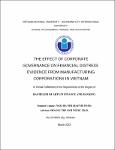| dc.description.abstract | This study examines how corporate governance processes affect financial distress in
Vietnam-based manufacturing enterprises. 129 Vietnamese HOSE producers registered between
2011 and 2018 were sampled to evaluate this correlation. Conditional Logistic Regression (CLR)
and pair-matched analysis will be utilized to differentiate between troubled and non-distressed
organizations. This study examines how board of directors affects financial hardship through
ownership structure (ownership concentration, non-institutional ownership concentration,
institutional ownership concentration, and board ownership) and board composition ( independent
directors, board size and CEO duality). The control variables consist of firm characteristics (firm
size and firm age) and financial ratios (profitability, financial expenses, retained earnings, liquidity
ratio, and leverage ratio). According to the findings of the conditional logistic regression model,
independent directors, and a number of other variables, such as ownership concentration, are
primarily responsible for assisting distressed businesses. On the other hand, businesses might enter
the distressed stage due to high board ownership and dual CEO leadership. Moreover, according
to financial metrics, enterprises with high profitability are able to survive difficult times.
Furthermore, it implies that a larger company has a greater chance of resolving financial issues. | en_US |


